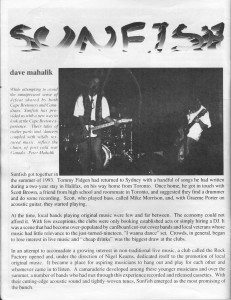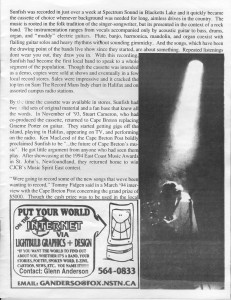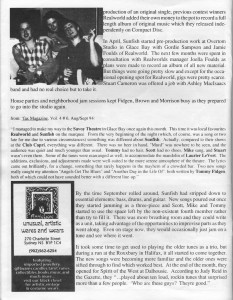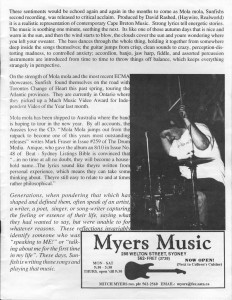
Sunfish got together in the summer of 1993. Tom Fidgen had returned to Sydney with a handful of songs he had written during the 2 year stay in Halifax, on his way home from Toronto. Once home, he got in touch with Scott Brown, a friend from high school and roommate in Toronto, and suggested that they find a drummer and do some recording. Scott, who played bass, called Mike Morrison, and, with Graeme Porter on acoustic guitar, they started playing.
At the time, local bands playing original music were few and far between. The economy could not afford it. With few expectations, the clubs were only booking established acts or simply hiring a DJ. It was a scene that had become over-populated by cardboard cut-out cover bands and local veterans whose music had little relevance to the just turned 19, “I wanna dance” set. Crowds, in general began to lose interest in live music and cheap drinks was the biggest draw at the clubs.
In an attempt to accommodate a growing interest in non-traditional live music, a club called the Rock Factory opened and, under the direction of Nigel Kearns, dedicated itself to the promotion of local original music. It became a place for aspiring musicians to hang out and play for each other and whoever came in to listen. A camaraderie developed among these younger musicians and over the summer, a number of bands who had met through this experience recorded and released music on cassettes. With their cutting edge acoustic sound and tightly-woven tunes, Sunfish emerged as the most promising of the bunch.

By the time the cassette was available in stores, Sunfish had two solid sets of original material and a fan base that knew all the words. In November of 1993, Stuart Cameron, who had co-produced the cassette, returned to Cape Breton replacing Graeme Porter on guitar. They started getting gigs off the island, playing in Halifax, appearing on TV, and performing on the radio. Ken MacLeod of the Cape Breton Post boldly proclaimed Sunfish to be “…the future of Cape Breton music”. He got little argument from anyone who had seen them play. After showcasing at the 1994 East Coast Music Awards in St. John’s, Newfoundland, they returned home to win CJCB’s Music Spirit East contest.
“We’re going to record some of the new songs that we have been wanting to record,” Tommy Fidgen said in a March 1994 interview with the Cape Breton Post concerning the grand prize of $5000. Though the cash prize was to be used in the local production of an original single, previous contest winners Realworld added their own money to the pot to record a full-length album of original music which they released independently on compact disc.

House parties and neighborhood jam sessions kept Fidgen, Brown and Morrison busy as they prepared to go in the studio again.
“I managed to make my way to the Savoy Theatre in Glace Bay once again this month. This time it was local favorites Realworld and Sunfish on the marquee. From the very beginning of the night (which, of course, was a song or two late for me due to various circumstances) something was different about Sunfish. Actually, compared to their shows at the Club Capri, everything was different. There was no beer in hand, Murd was nowhere to be seen, and the audience was quiet and much younger than usual. Tommy had no hair, Scott had no shoes, Mike sang, and Stuart wasn’t even there. Some of the tunes were re-arranged as well, to accommodate the mandolin of Laurier LeVert. The additions, exclusions, and adjustments made were well-suited to the more serene atmosphere of the theatre. The lyrics came out brilliantly, for a change, something that rarely happens in the mayhem of a crowded bar. Two new songs really caught my attention “Angels Get The Blues” and “Another Day In The Life Of” both written by Tommy Fidgen, both of which could not have sounded better with a different line-up”. (an excerpt from ’FAX magazine).
By the time September rolled around, Sunfish had stripped down to essential elements: bass, drums and guitar. New songs poured out once they started jamming as a three piece and Scott, Mike and Tommy started to use the space of the non-existing fourth member rather then try to fill it. There was more breathing room and they could write as a unit, taking advantage of the opportunities to improvise parts as they went along. Even on stage now, they would occasionally just jam on a tune and see where it went.
It took some time to get used to playing the older tunes as a trio, but during a run at the Roxxbury in Halifax, it all started to come together. The new songs were becoming more familiar and the oldest ones were sifted through to find what works best. At the end of the month, they opened for Spirit of the West at Dalhousie University. According to Judy Reid in the Gazzette, they “…played about ten loud, rockin tunes that surprised more then a few people. Who are these guys? They’re good.”

On the strength of Mola mola and the most recent ECMA showcases, Sunfish found themselves on the road with Toronto’s Change of Heart this past spring, touring the Atlantic provinces. They are currently in Ontario where they picked up a Much Music Video Award for Independent Video of the Year last month.
Mola mola has been shipped to Australia where the band is hoping to tour in the new year. By all accounts, the Aussies love the CD. “Mola Mola jumps out from the ratpack to become one of this year’s most outstanding releases” writes Mark Fraser in Issue #259 of The Drum. Anique, who gave the album an 8/10 in issue No. 48 of Beat – Sydney’s Listings Bible is convinced that “…in no time at all no doubt, they will become a household name… The lyrics sound like they’re written from personal experience, which means they can take some thinking about. They’re still easy to relate to and at times rather philosophical.”
Generations, when pondering that which has shaped and defined them, often speak of an artist, a writer, a poet, singer or song-writer capturing the feeling or essence of their life, saying what they had wanted to say, but were unable to for whatever reasons. These reflections invariably identify someone who was “speaking to me!” or “talking about me for the first time in my life”. These days, Sunfish is writing those songs and playing that music.

